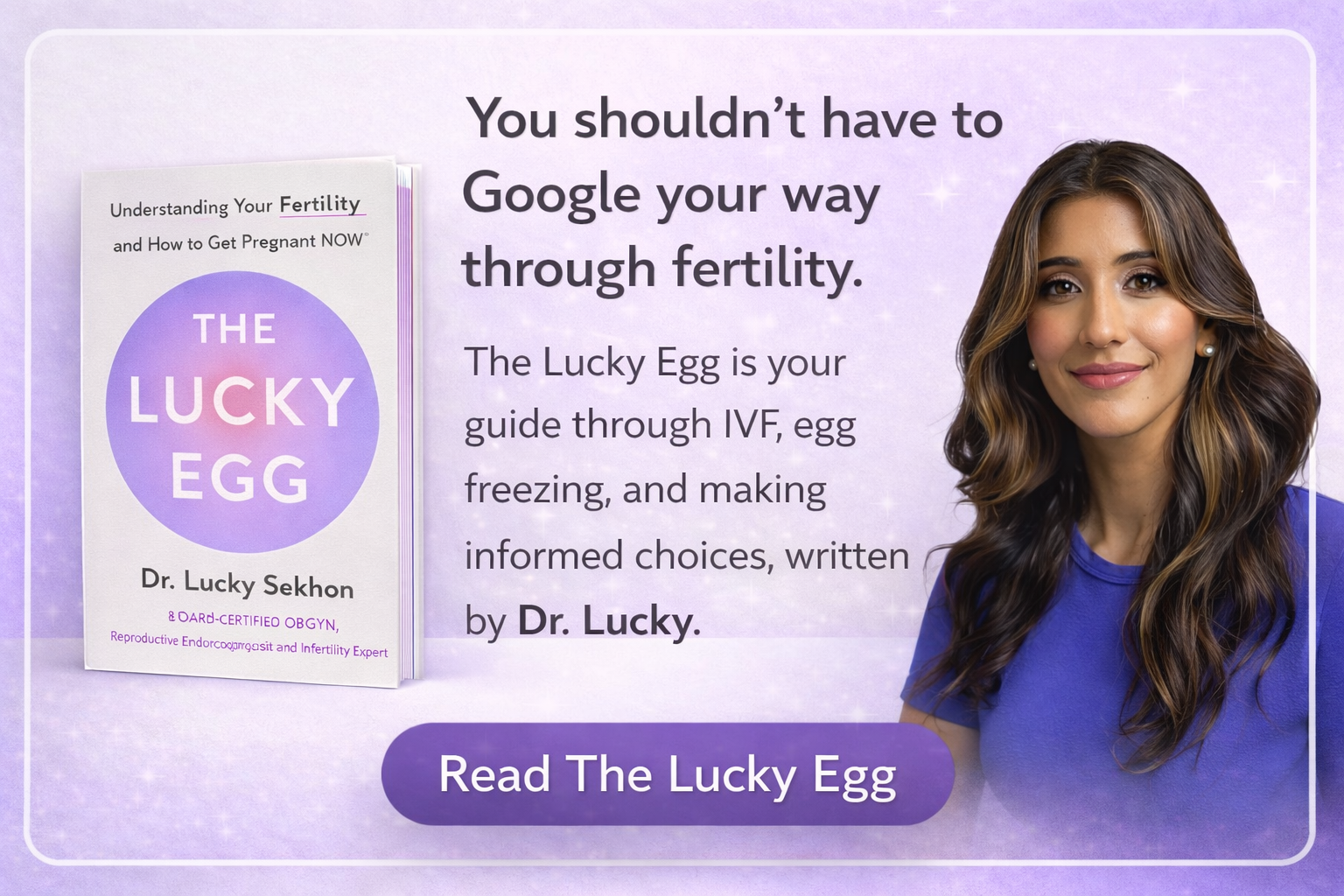10 IVF Myths Dr. Lucky Wants You to Stop Believing
If you’re considering IVF, or maybe you’re already knee-deep in injections, monitoring appointments, and late-night Googling, you’ve probably come across claims about what IVF can and can’t do that sound convincing. These often come from influencers, self-proclaimed fertility “experts” on Reddit, or even well-meaning friends or relatives. The problem? Many of these “facts” are actually myths!
I’m Dr. Lucky Sekhon, a reproductive endocrinologist and infertility specialist based in New York City. Over the years, I’ve had the privilege of guiding thousands of patients through their fertility journeys: each one unique, emotional, and deeply personal. Through my practice, my book The Lucky Egg, and my Instagram account, my mission is to demystify fertility medicine. If you would like to stay up to date on my latest fertility updates, I encourage you to follow me on Instagram or subscribe to my monthly newsletter.
As someone who not only practices fertility medicine but has also gone through IVF myself, I can’t tell you how frustrated, and downright angry, I get when I see firsthand how my patients suffer through unnecessary anxiety, false hope and are lead to make decisions based on misinformation around IVF being spread online. In this blog post, I’m going to straight the record straight and bust the top 10 myths surrounding IVF that I hear most often.
1. IVF guarantees pregnancy
I wish I could promise every patient that IVF will work the first time. The truth? IVF gives you the best shot at pregnancy, but it’s not magic. Success depends on multiple factors: your age, egg quality, sperm health, embryo genetics, and the environment of your uterus. Even the most perfect-looking embryo can fail to implant.
At my clinic, I’ve seen patients conceive on their first transfer, and others who needed several tries. Science is powerful, but it’s not perfect…and that’s okay.
2. IVF can reverse the effects of age on egg quality
Let me say this loud and clear for the people in the back of this digital room: IVF cannot turn back the biological clock! As we age, our egg quality naturally declines. This is why women in their early 40s often need more cycles or may need to consider donor eggs. I’ve had patients in their mid-30s bank embryos for future use, and when they come back years later, they’re thankful they froze those embryos derived from younger, healthier eggs. IVF works with biology, not against it.
3. IVF causes early menopause
I can’t tell you how many patients worry they’ll “use up” their eggs by doing IVF. Here’s the science: every month, your ovaries recruit a batch of eggs: most of which naturally die off. IVF simply rescues more of those eggs from the batch you were already going to lose that cycle. It does not deplete your future supply or make you go into menopause earlier. That’s a myth that needs to retire.
4. IVF causes cancer
This one is as scary as it is scientifically unfounded, and I completely understand why it’s such a common fear. Thankfully, multiple large studies have shown that IVF and fertility medications do not increase your risk of invasive cancers like breast or ovarian cancer. In fact, we safely stimulate and retrieve eggs for patients with cancer to preserve their fertility before chemotherapy. If there were a link, we wouldn’t be doing this.
5. IVF always means twins
This is one of the most persistent myths I still hear: patients come into my office terrified (or secretly excited) at the thought that IVF automatically equals a twin pregnancy. Years ago, when IVF was new, it was common practice to transfer multiple embryos at once because success rates were lower and freezing technology wasn’t as advanced. Back then, twins and even triplets were much more frequent outcomes.
Today, things have changed. With advances in embryo freezing, culture techniques, and genetic testing, we can now safely transfer one healthy embryo at a time and achieve excellent success rates. At my clinic, we aim for one healthy baby at a time because singleton pregnancies carry far fewer risks for both mom and baby. While twins can still happen (because sometimes an embryo can split into identical twins), the risk is much lower than people assume. IVF is about precision, not playing the odds.
Learn more in my detailed guide on how single embryo transfer reduces the risk of twins in IVF.
6. You can use IVF to pick your baby’s traits
Sorry, folks, we’re not living in a sci-fi movie. Preimplantation genetic testing (PGT) can screen embryos for chromosomal abnormalities and certain single-gene disorders. But you can’t custom-select traits like eye color, height, or intelligence. And ethically, we shouldn’t go down that road. IVF is about helping families grow, not designer babies.
7. Bed rest after embryo transfer improves success
This is one of my favorites to bust because it gives patients permission to relax. Lying flat in bed after transfer doesn’t help the embryo stick. In fact, being completely sedentary can reduce blood flow. I tell my patients to live their normal life: gentle movement is good! Your embryo knows what to do; you don’t have to micromanage it. There is no shame in taking the day off after your transfer to relax, but just know that it’s really not going to impact the chances of your embryo transfer succeeding.
8. IVF “add-ons” always boost success rates
The fertility world is full of “extras”: EmbryoGlue, endometrial scratching, the Endometrial Receptivity Analysis (ERA) test, you name it. These are often marketed as “must-haves” to improve implantation. Here’s the truth: most add-ons lack strong evidence that they improve live birth rates. Many just add cost and complexity to an already emotionally and financially taxing process. Unless there’s a clear medical indication, these so-called boosters are usually unnecessary.
I recently published a post on why the ERA test in IVF might not be worth it and what the science really says.
9. Minimal stimulation or “mini-IVF” is better
Some clinics market “mini-IVF” as a gentler, safer, even superior option to normal IVF through the use of lower dose stimulation protocols. The reality? While low-dose protocols have a role in select patients, they usually yield fewer eggs and embryos, which can decrease your overall chances of success. I often explain this to patients who are deciding between approaches: more eggs generally mean more embryos to work with, and that’s especially important as age increases.
Further, one thing to remember, is that If you are going through the huge financial, emotional and physical burden that IVF entails, why would you opt for an approach that will yield fewer eggs and thus reduce the chances of success? Unless you enjoy going through multiple egg retrieval cycles, the feel of needles poking your body on a daily basis, and have a deep pile of cash to fund all of it, for most of us mini-IVF is setting yourself up for an IVF cycle that yields fewer embryos.
For a deep dive on mini-IVF, check out my post on the truth about mini-IVF..
10. “Omnitrope” (Human Growth Hormone) improves IVF success
One of the most common questions I get is: “Should I add Omnitrope to my IVF protocol?” Omnitrope, a form of human growth hormone (hGH), has been heavily marketed online and in fertility forums as a “miracle booster” for egg quality. I understand why it’s tempting: when you’re going through IVF, you want to do everything possible to improve your chances.
Here’s the truth: despite the hype, there is no strong scientific evidence that Omnitrope improves egg quality or IVF outcomes for the average patient. Most studies are small, conflicting, and do not show clear benefits. In my practice, I reserve its use for very select situations where there may be a theoretical benefit, such as in women with severely diminished ovarian reserve who have had multiple poor responses to IVF.
For everyone else, adding Omnitrope is more likely to add cost (it’s expensive!) and complexity than results. I tell my patients: if a medication hasn’t been proven to help and carries a price tag like this, we need to be really clear about why we’re using it.
Read more about why Omnitrope is an Omni-nope for me in my analysis on Omnitrope and why growth hormone promises in IVF fall short.
Conclusion
Going through IVF is one of the most emotionally charged, physically demanding, and financially significant journeys you can take. When you’re in it, the last thing you need is to be bombarded with myths that fuel anxiety and cloud your decision-making. The reality is, IVF is not a magical guarantee—but it is an incredible scientific tool that, when used thoughtfully and with the right guidance, can help you achieve your dream of becoming a parent
My hope is that busting these myths not only clears up confusion but also gives you back a sense of control. Knowledge is power: especially when that knowledge comes from evidence, not Instagram rumors or Reddit threads.
Remember, you’re not alone in this. Whether you’re just starting out or have been on this path for a while, there is hope, and there are options. If you want to continue learning from me, hearing honest insights, and staying updated with the latest in fertility medicine, make sure to follow me on Instagram and subscribe to my monthly newsletter.
If you are in the NYC area and are interested in seeing me for a consult in my office, you can request an appointment here.


